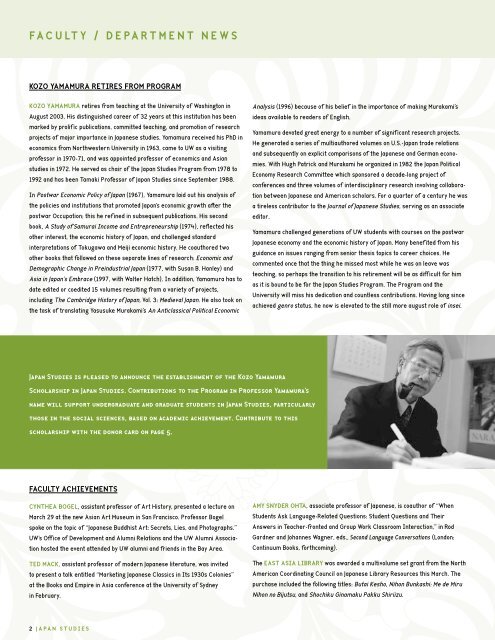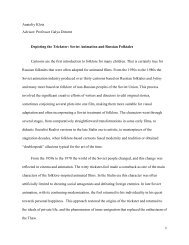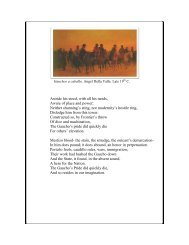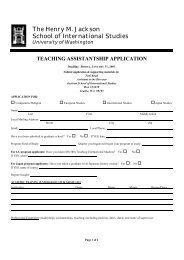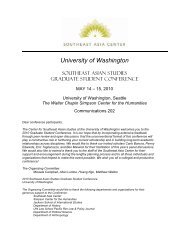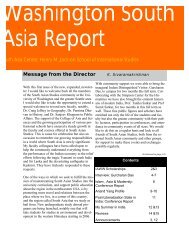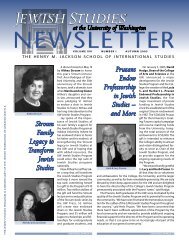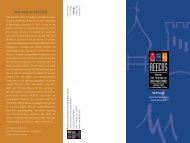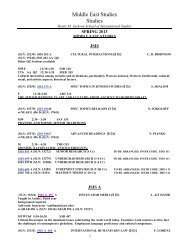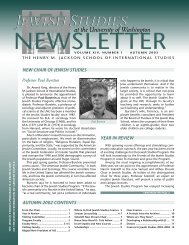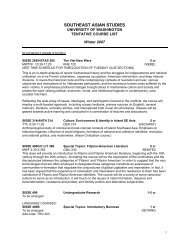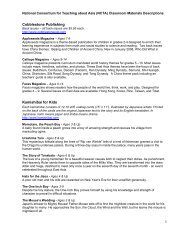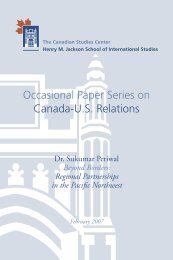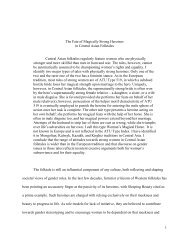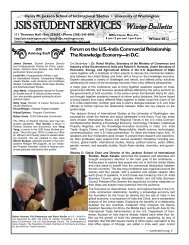from the chair - Jackson School of International Studies - University ...
from the chair - Jackson School of International Studies - University ...
from the chair - Jackson School of International Studies - University ...
You also want an ePaper? Increase the reach of your titles
YUMPU automatically turns print PDFs into web optimized ePapers that Google loves.
FACULTY / DEPARTMENT NEWS<br />
KOZO YAMAMURA RETIRES FROM PROGRAM<br />
KOZO YAMAMURA retires <strong>from</strong> teaching at <strong>the</strong> <strong>University</strong> <strong>of</strong> Washington in<br />
August 2003. His distinguished career <strong>of</strong> 32 years at this institution has been<br />
marked by prolif ic publications, committed teaching, and promotion <strong>of</strong> research<br />
projects <strong>of</strong> major importance in Japanese studies. Yamamura received his PhD in<br />
economics <strong>from</strong> Northwestern <strong>University</strong> in 1963, came to UW as a visiting<br />
pr<strong>of</strong>essor in 1970-71, and was appointed pr<strong>of</strong>essor <strong>of</strong> economics and Asian<br />
studies in 1972. He served as <strong>chair</strong> <strong>of</strong> <strong>the</strong> Japan <strong>Studies</strong> Program <strong>from</strong> 1978 to<br />
1992 and has been Tamaki Pr<strong>of</strong>essor <strong>of</strong> Japan <strong>Studies</strong> since September 1988.<br />
In Postwar Economic Policy <strong>of</strong> Japan (1967), Yamamura laid out his analysis <strong>of</strong><br />
<strong>the</strong> policies and institutions that promoted Japan’s economic growth after <strong>the</strong><br />
postwar Occupation; this he refined in subsequent publications. His second<br />
book, A Study <strong>of</strong> Samurai Income and Entrepreneurship (1974), reflected his<br />
o<strong>the</strong>r interest, <strong>the</strong> economic history <strong>of</strong> Japan, and challenged standard<br />
interpretations <strong>of</strong> Tokugawa and Meiji economic history. He coauthored two<br />
o<strong>the</strong>r books that followed on <strong>the</strong>se separate lines <strong>of</strong> research: Economic and<br />
Demographic Change in Preindustrial Japan (1977, with Susan B. Hanley) and<br />
Asia in Japan’s Embrace (1997, with Walter Hatch). In addition, Yamamura has to<br />
date edited or coedited 15 volumes resulting <strong>from</strong> a variety <strong>of</strong> projects,<br />
including The Cambridge History <strong>of</strong> Japan, Vol. 3: Medieval Japan. He also took on<br />
<strong>the</strong> task <strong>of</strong> translating Yasusuke Murakami’s An Anticlassical Political Economic<br />
Japan <strong>Studies</strong> is pleased to announce <strong>the</strong> establishment <strong>of</strong> <strong>the</strong> Kozo Yamamura<br />
Scholarship in Japan <strong>Studies</strong>. Contributions to <strong>the</strong> Program in Pr<strong>of</strong>essor Yamamura’s<br />
name will support undergraduate and graduate students in Japan <strong>Studies</strong>, particularly<br />
those in <strong>the</strong> social sciences, based on academic achievement. Contribute to this<br />
scholarship with <strong>the</strong> donor card on page 5.<br />
FACULTY ACHIEVEMENTS<br />
CYNTHEA BOGEL, assistant pr<strong>of</strong>essor <strong>of</strong> Art History, presented a lecture on<br />
March 29 at <strong>the</strong> new Asian Art Museum in San Francisco. Pr<strong>of</strong>essor Bogel<br />
spoke on <strong>the</strong> topic <strong>of</strong> “Japanese Buddhist Art: Secrets, Lies, and Photographs.”<br />
UW’s Office <strong>of</strong> Development and Alumni Relations and <strong>the</strong> UW Alumni Association<br />
hosted <strong>the</strong> event attended by UW alumni and friends in <strong>the</strong> Bay Area.<br />
TED MACK, assistant pr<strong>of</strong>essor <strong>of</strong> modern Japanese literature, was invited<br />
to present a talk entitled “Marketing Japanese Classics in Its 1930s Colonies”<br />
at <strong>the</strong> Books and Empire in Asia conference at <strong>the</strong> <strong>University</strong> <strong>of</strong> Sydney<br />
in February.<br />
2 JAPAN STUDIES<br />
Analysis (1996) because <strong>of</strong> his belief in <strong>the</strong> importance <strong>of</strong> making Murakami’s<br />
ideas available to readers <strong>of</strong> English.<br />
Yamamura devoted great energy to a number <strong>of</strong> signif icant research projects.<br />
He generated a series <strong>of</strong> multiauthored volumes on U.S.-Japan trade relations<br />
and subsequently on explicit comparisons <strong>of</strong> <strong>the</strong> Japanese and German economies.<br />
With Hugh Patrick and Murakami he organized in 1982 <strong>the</strong> Japan Political<br />
Economy Research Committee which sponsored a decade-long project <strong>of</strong><br />
conferences and three volumes <strong>of</strong> interdisciplinary research involving collaboration<br />
between Japanese and American scholars. For a quarter <strong>of</strong> a century he was<br />
a tireless contributor to <strong>the</strong> Journal <strong>of</strong> Japanese <strong>Studies</strong>, serving as an associate<br />
editor.<br />
Yamamura challenged generations <strong>of</strong> UW students with courses on <strong>the</strong> postwar<br />
Japanese economy and <strong>the</strong> economic history <strong>of</strong> Japan. Many benef ited <strong>from</strong> his<br />
guidance on issues ranging <strong>from</strong> senior <strong>the</strong>sis topics to career choices. He<br />
commented once that <strong>the</strong> thing he missed most while he was on leave was<br />
teaching, so perhaps <strong>the</strong> transition to his retirement will be as diff icult for him<br />
as it is bound to be for <strong>the</strong> Japan <strong>Studies</strong> Program. The Program and <strong>the</strong><br />
<strong>University</strong> will miss his dedication and countless contributions. Having long since<br />
achieved genro status, he now is elevated to <strong>the</strong> still more august role <strong>of</strong> insei.<br />
AMY SNYDER OHTA, associate pr<strong>of</strong>essor <strong>of</strong> Japanese, is coauthor <strong>of</strong> “When<br />
Students Ask Language-Related Questions: Student Questions and Their<br />
Answers in Teacher-fronted and Group Work Classroom Interaction,” in Rod<br />
Gardner and Johannes Wagner, eds., Second Language Conversations (London:<br />
Continuum Books, forthcoming).<br />
The EAST ASIA LIBRARY was awarded a multivolume set grant <strong>from</strong> <strong>the</strong> North<br />
American Coordinating Council on Japanese Library Resources this March. The<br />
purchase included <strong>the</strong> following titles: Butai Kesho, Nihon Bunkashi: Me de Miru<br />
Nihon no Bijutsu, and Shochiku Ginamaku Pakku Shiriizu.


